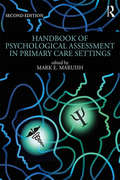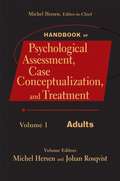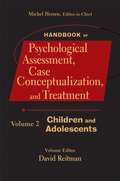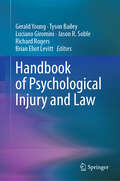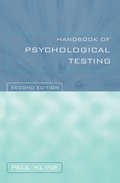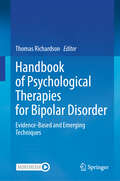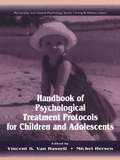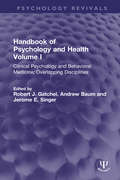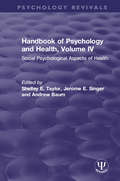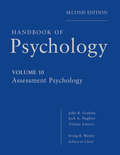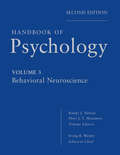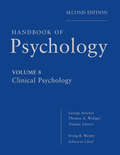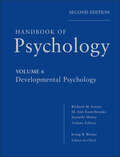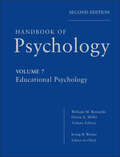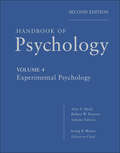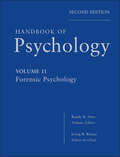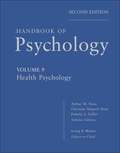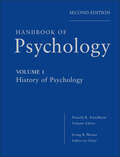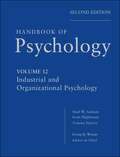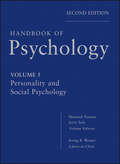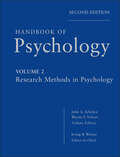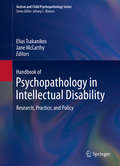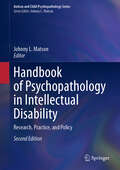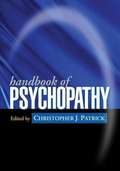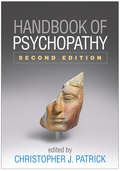- Table View
- List View
Handbook of Psychological Assessment in Primary Care Settings
by Mark E. MaruishThe second edition Handbook of Psychological Assessment in Primary Care Settings offers an overview of the application of psychological screening and assessment instruments in primary care settings. This indispensable reference addresses current psychological assessment needs and practices in primary care settings to inform psychologists, behavioral health clinicians, and primary care providers the clinical benefits that can result from utilizing psychological assessment and other behavioral health care services in primary care settings.
Handbook of Psychological Assessment, Case Conceptualization, and Treatment, Adults
by Michel Hersen Johan RosqvistEdited by recognized experts Michel Hersen and Johan Rosqvist, Handbook of Psychological Assessment, Case Conceptualization, and Treatment, Volume 1, Adults, is a thorough and practical reference for those working with adults. Bringing together the most current theories and evidence-based applications, chapters address issues of importance including ethics, medical issues, panic and agoraphobia, obsessive-compulsive disorder, and posttraumatic stress disorder. Each chapter follows a structured format, opening with an overview of assessment, followed by case conceptualization, and, finally, recommended treatment.
Handbook of Psychological Assessment, Case Conceptualization, and Treatment, Children and Adolescents
by Michel Hersen David ReitmanEdited by recognized experts Michel Hersen and David Reitman, Handbook of Psychological Assessment, Case Conceptualization, and Treatment, Volume 2, Children and Adolescents, is a thorough and practical reference for those working with children and adolescents. Bringing together the most current theories and evidence-based applications, chapters address issues of importance including depressive disorders, substance use disorders, and childhood psychosis. Each chapter follows a structured format, opening with an overview of assessment, followed by case conceptualization, and, finally, recommended treatment.
Handbook of Psychological Injury and Law
by Richard Rogers Gerald Young Tyson Bailey Luciano Giromini Jason R. Soble Brian Eliot LevittThis book provides a comprehensive presentation of psychological problems, such as posttraumatic stress, depression and chronic pain, that are the result of injury or trauma and legal proceedings, such as tort after motor vehicle collisions. It stresses the complex nature of these disabilities, particularly in the judicial setting, and the critical task of accurately assessing and diagnosing the extent of the injury. Assessments involve the use of standardized tests, including those that assess for negative response bias and possible malingering. The chapters that follow cover key psychological disorders and explore their effects in a range of populations, which can vary by age, sex, and minority or racial status. It encompasses international perspectives and emphasizes the importance of relevant factors that affect assessment, rehabilitation, and compensation. It is ideal for psychologists and mental health professionals working in in a field that requires a comprehensive, scientifically-informed, impartial approach to assessment that will stand up in court. This book provides a comprehensive presentation of psychological problems, such as posttraumatic stress, depression and chronic pain, that are the result of injury or trauma and legal proceedings, such as tort after motor vehicle collisions. It stresses the complex nature of these disabilities, particularly in the judicial setting, and the critical task of accurately assessing and diagnosing the extent of the injury. Assessments involve the use of standardized tests, including those that assess for negative response bias and possible malingering. The chapters that follow cover key psychological disorders and explore their effects in a range of populations, which can vary by age, sex, and minority or racial status. It encompasses international perspectives and emphasizes the importance of relevant factors that affect assessment, rehabilitation, and compensation. It is ideal for psychologists and mental health professionals working in in a field that requires a comprehensive, scientifically-informed, impartial approach to assessment that will stand up in court.
Handbook of Psychological Testing
by Paul KlineSince publication in its first edition the Handbook of Psychological Testing has become the standard text for organisational and educational psychologists. It offers the only comprehensicve, modern and clear account of the whole of the field of psychometrics. It covers psychometric theory, the different kinds of psychological test, applied psychological testing, and the evaluation of the best published psychological tests. It is outstanding for its detailed and complete coverage of the field, its clarity (even for the non-mathematical) and its emphasis on the practical application of psychometric theory in psychology and education, as well as in vocational, occupational and clinical fields.For this second edition the Handbook has been extensively revised and updated to include the latest research and thinking in the field. Unlike other work in this area, it challenges the scientific rigour of conventional psychometrics and identifies groundbreaking new ways forward.
Handbook of Psychological Therapies for Bipolar Disorder: Evidence-Based and Emerging Techniques
by Thomas RichardsonThis comprehensive handbook covers a full range of evidence-based psychological therapies for Bipolar Disorder, with attention to special populations for this treatment. Chapters are concise and practical with case examples and therapy transcripts, and tips to aid the clinician. An emphasis on psychological theory balances existing medical approaches. Practitioners of all types will find this material relevant, including clinical and counseling psychologists, CBT therapists, psychiatrists, family therapists, as well as trainees and postgraduate students. It will also be useful for researchers in evaluating and refining interventions.
Handbook of Psychological Treatment Protocols for Children and Adolescents
by Michel Hersen Vincent B. Van HasseltIn the last decade, mental health professionals have been under mounting pressure to demonstrate the cost effectiveness of their treatment choices and practices. Progress has been made, related in part to improvements and refinements in diagnostic classifications that are increasingly empirically determined and behaviorally based. Historically, however, research on the treatment of children and adolescents has lagged behind research on the treatment of adults. The growing realization that early intervention can prevent serious psychological dysfunction in adulthood has stimulated much more interest and attention in recent years, and a number of innovative and efficacious treatment strategies have been developed. But most of these are not widely known outside the contexts of the major research programs in which they originated and were tested. Complete protocols have rarely been disseminated or replicated; descriptions are typically embedded in the "methods" sections of journal articles or briefly given in chapters of volumes addressing a diversity of problems. The Handbook of Psychological Treatment Protocols for Children and Adolescents is the first attempt to bridge this gap between clinical research and practice. Drawing together systematic, empirically-based guidelines for accountable clinical work with children and adolescents with varying presenting problems, it is a compendium of state-of-the-art treatment manuals. Specific instructions and relevant case illustrations facilitate the practitioner's efforts to replicate the approaches. The Handbook will be welcomed by a wide range of mental health professionals and their students.
Handbook of Psychology and Health, Volume I: Clinical Psychology and Behavioral Medicine: Overlapping Disciplines (Psychology Revivals)
by Robert J. Gatchel Andrew Baum Jerome E. SingerOriginally published in 1982, this volume deals with behavioral medicine and clinical psychology. Much of what psychologists had been able to contribute to the study and treatment of health and illness had, to this point, been derived from clinical research and behavioral treatment. This volume presents some of this work, providing a fairly comprehensive view of the overlap between behavioral medicine and clinical psychology. Its purpose was to present some of the traditional areas of research and practice in clinical psychology that had directly and indirectly contributed to the development of behavioral medicine. Before the ‘birth’ of behavioral medicine, which subsequently attracted psychologists from many different areas ranging from social psychology to operant conditioning, the chief link between psychology and medicine consisted of the relationship, albeit sometimes fragile and tumultuous, between clinical psychology and psychiatry. Many of the behavioral assessment and treatment methods now being employed in the field of behavioral medicine were originally developed in the discipline of clinical psychology.
Handbook of Psychology and Health, Volume IV: Social Psychological Aspects of Health (Psychology Revivals)
by Andrew Baum; Shelley E. Taylor; Jerome E. SingerOriginally published in 1984, the study of psychological aspects of health was a rapidly expanding enterprise. Most of the contributors to this volume were trained as social psychologists or by social psychologists. Some have been more applied in their focus or on the edge of several fields. All, however, share a common approach, focusing on the individual as he or she is buffeted about by social forces and copes with these forces. All consider situational and psychological factors in the determination of behavior, emotion, or cognition and all apply their expertise to the study of health-related issues. The grouping of the chapters in this volume by the authors’ subspecialty, social psychology, is a somewhat unconventional method of clustering. Ordinarily, the materials presented here would be published in journals or texts concerned with behavior or psychosocial in health and medicine, or in specialty publications dealing with a particular disease or health issue. That clustering of articles is functional in providing information to those most likely to utilize it, but it diffuses the origin and background of the studies. These chapters speak to the diversity of health issues that are amenable to successful social psychological analysis.
Handbook of Psychology, Assessment Psychology
by Irving B. Weiner Jack A. Naglieri John R. GrahamPsychology is of interest to academics from many fields, as well as to the thousands of academic and clinical psychologists and general public who can't help but be interested in learning more about why humans think and behave as they do. This award-winning twelve-volume reference covers every aspect of the ever-fascinating discipline of psychology and represents the most current knowledge in the field. This ten-year revision now covers discoveries based in neuroscience, clinical psychology's new interest in evidence-based practice and mindfulness, and new findings in social, developmental, and forensic psychology.
Handbook of Psychology, Behavioral Neuroscience
by Irving B. Weiner Sheri Mizumori Randy J. NelsonPsychology is of interest to academics from many fields, as well as to the thousands of academic and clinical psychologists and general public who can't help but be interested in learning more about why humans think and behave as they do. This award-winning twelve-volume reference covers every aspect of the ever-fascinating discipline of psychology and represents the most current knowledge in the field. This ten-year revision now covers discoveries based in neuroscience, clinical psychology's new interest in evidence-based practice and mindfulness, and new findings in social, developmental, and forensic psychology.
Handbook of Psychology, Clinical Psychology
by Irving B. Weiner Thomas A. Widiger George StrickerPsychology is of interest to academics from many fields, as well as to the thousands of academic and clinical psychologists and general public who can't help but be interested in learning more about why humans think and behave as they do. This award-winning twelve-volume reference covers every aspect of the ever-fascinating discipline of psychology and represents the most current knowledge in the field. This ten-year revision now covers discoveries based in neuroscience, clinical psychology's new interest in evidence-based practice and mindfulness, and new findings in social, developmental, and forensic psychology.
Handbook of Psychology, Developmental Psychology
by Irving B. Weiner Richard M. Lerner Jayanthi Mistry M. Ann EasterbrooksPsychology is of interest to academics from many fields, as well as to the thousands of academic and clinical psychologists and general public who can't help but be interested in learning more about why humans think and behave as they do. This award-winning twelve-volume reference covers every aspect of the ever-fascinating discipline of psychology and represents the most current knowledge in the field. This ten-year revision now covers discoveries based in neuroscience, clinical psychology's new interest in evidence-based practice and mindfulness, and new findings in social, developmental, and forensic psychology.
Handbook of Psychology, Educational Psychology
by Irving B. Weiner Gloria E. Miller William M. ReynoldsPsychology is of interest to academics from many fields, as well as to the thousands of academic and clinical psychologists and general public who can't help but be interested in learning more about why humans think and behave as they do. This award-winning twelve-volume reference covers every aspect of the ever-fascinating discipline of psychology and represents the most current knowledge in the field. This ten-year revision now covers discoveries based in neuroscience, clinical psychology's new interest in evidence-based practice and mindfulness, and new findings in social, developmental, and forensic psychology.
Handbook of Psychology, Experimental Psychology
by Irving B. Weiner Robert W. Proctor Alice F. HealyPsychology is of interest to academics from many fields, as well as to the thousands of academic and clinical psychologists and general public who can't help but be interested in learning more about why humans think and behave as they do. This award-winning twelve-volume reference covers every aspect of the ever-fascinating discipline of psychology and represents the most current knowledge in the field. This ten-year revision now covers discoveries based in neuroscience, clinical psychology's new interest in evidence-based practice and mindfulness, and new findings in social, developmental, and forensic psychology.
Handbook of Psychology, Forensic Psychology
by Irving B. Weiner Randy K. OttoPsychology is of interest to academics from many fields, as well as to the thousands of academic and clinical psychologists and general public who can't help but be interested in learning more about why humans think and behave as they do. This award-winning twelve-volume reference covers every aspect of the ever-fascinating discipline of psychology and represents the most current knowledge in the field. This ten-year revision now covers discoveries based in neuroscience, clinical psychology's new interest in evidence-based practice and mindfulness, and new findings in social, developmental, and forensic psychology.
Handbook of Psychology, Health Psychology
by Irving B. Weiner Pamela A. Geller Arthur M. Nezu Christine M. NezuPsychology is of interest to academics from many fields, as well as to the thousands of academic and clinical psychologists and general public who can't help but be interested in learning more about why humans think and behave as they do. This award-winning twelve-volume reference covers every aspect of the ever-fascinating discipline of psychology and represents the most current knowledge in the field. This ten-year revision now covers discoveries based in neuroscience, clinical psychology's new interest in evidence-based practice and mindfulness, and new findings in social, developmental, and forensic psychology.
Handbook of Psychology, History of Psychology
by Irving B. WeinerPsychology is of interest to academics from many fields, as well as to the thousands of academic and clinical psychologists and general public who can't help but be interested in learning more about why humans think and behave as they do. This award-winning twelve-volume reference covers every aspect of the ever-fascinating discipline of psychology and represents the most current knowledge in the field. This ten-year revision now covers discoveries based in neuroscience, clinical psychology's new interest in evidence-based practice and mindfulness, and new findings in social, developmental, and forensic psychology.
Handbook of Psychology, Industrial and Organizational Psychology
by Irving B. Weiner Neal W. Schmitt Scott HighhousePsychology is of interest to academics from many fields, as well as to the thousands of academic and clinical psychologists and general public who can't help but be interested in learning more about why humans think and behave as they do. This award-winning twelve-volume reference covers every aspect of the ever-fascinating discipline of psychology and represents the most current knowledge in the field. This ten-year revision now covers discoveries based in neuroscience, clinical psychology's new interest in evidence-based practice and mindfulness, and new findings in social, developmental, and forensic psychology.
Handbook of Psychology, Personality and Social Psychology
by Irving B. Weiner Howard A. Tennen Jerry M. SulsPsychology is of interest to academics from many fields, as well as to the thousands of academic and clinical psychologists and general public who can't help but be interested in learning more about why humans think and behave as they do. This award-winning twelve-volume reference covers every aspect of the ever-fascinating discipline of psychology and represents the most current knowledge in the field. This ten-year revision now covers discoveries based in neuroscience, clinical psychology's new interest in evidence-based practice and mindfulness, and new findings in social, developmental, and forensic psychology.
Handbook of Psychology, Research Methods in Psychology
by Irving B. Weiner Wayne F. Velicer John A. SchinkaPsychology is of interest to academics from many fields, as well as to the thousands of academic and clinical psychologists and general public who can't help but be interested in learning more about why humans think and behave as they do. This award-winning twelve-volume reference covers every aspect of the ever-fascinating discipline of psychology and represents the most current knowledge in the field. This ten-year revision now covers discoveries based in neuroscience, clinical psychology's new interest in evidence-based practice and mindfulness, and new findings in social, developmental, and forensic psychology.
Handbook of Psychopathology in Intellectual Disability
by Jane Mccarthy Elias TsakanikosThe complex intersecting of genetic, biological, and environmental factors can make intellectual impairments difficult for clinicians to assess and treat. When such comorbid conditions as substance abuse or bipolar disorder are part of the equation, so are increased risks for clinical uncertainties and therapeutic dead-ends. The Handbook of Psychopathology in Intellectual Disability reflects the diversity of its subject in prevalence and presentation, testing methods and treatment options. Besides focusing on specific pathologies as they affect the course of intellectual disability (ID), its coverage spans the field from in-depth analyses of psychosocial aspects of ID to promising new findings in genetics and the ongoing challenge of providing personalized care tailored to individual client needs. Expert contributors bridge gaps between the evidence base and best practices and improved policy for maximum utility. In addition, chapters are written to benefit the widest variety of professionals treating clients with ID across disciplines. Key areas featured in the Handbook include: General issues and assessment methods. Core etiological approaches, including neuroimaging. Comorbid psychopathology, including mood, anxiety, and personality disorders. Common clinical conditions, such as ADHD, autism, and behavior problems. Medical and psychological interventions as well as community and inpatient services. Future directions in research and evidence-based practices. The Handbook of Psychopathology in Intellectual Disability is an essential reference for researchers, professors, and graduate students as well as clinicians and other scientist-practitioners in clinical psychology, psychiatry, social work, rehabilitation medicine, public health, and neuropsychology.
Handbook of Psychopathology in Intellectual Disability: Research, Practice, and Policy (Autism and Child Psychopathology Series)
by Johnny L. MatsonThe Second Edition of the handbook reflects the diversity of this complex subject matter, addressing its prevalence and presentation, testing methods, and treatment options. In addition to focusing on specific psychopathologies as they affect the course of intellectual disability (ID), several new chapters and significantly updated coverage span the field from in-depth analyses of psychosocial aspects of ID to promising new findings in genetics and the ongoing challenges of tailoring personalized care to meet individual client needs. Expert contributors bridge gaps between the evidence base and best practices for treating clients with ID across disciplines and discuss improved policy for maximum utility. Key areas of coverage include: Core etiological approaches in psychopathology and ID, including neuroimaging, behavioral phenotypes and genetic syndromes, psychological and social factors, and epilepsy. Comorbid psychopathologies (e.g., mood, anxiety, bipolar and personality disorders). Common clinical conditions (e.g., ADHD, autism, and behavior problems). Medical and psychological interventions (e.g., psychopharmacology) as well as community and inpatient services. The Handbook of Psychopathology in Intellectual Disability, Second Edition, is an essential reference for researchers, professors, and graduate students as well as clinicians, therapists, and other scientist-practitioners in developmental, school, and clinical child psychology, psychiatry, social work, rehabilitation medicine, public health, neuropsychology, and all related disciplines.
Handbook of Psychopathy
by Christopher PatrickWith contributions from foremost experts, this authoritative handbook provides a state-of-the-science review of current knowledge on the psychopathic personality. Coverage includes major theoretical models; conceptual and definitional questions; assessment approaches; and etiological pathways, ranging from family and environmental factors to genes, neurotransmitters, and brain systems. Manifestations of psychopathy in specific populations are addressed, as are links to salient problem behaviors such as aggression, substance abuse, sexual offending, and recidivism. Clinical and legal issues are also examined in depth. Seamlessly edited, each major thematic section concludes with a summary chapter that integrates the findings presented and highlights key questions for future research.
Handbook of Psychopathy, Second Edition
by Christopher J. PatrickWidely considered the go-to reference--and now extensively revised with over 65% new material--this authoritative handbook surveys the landscape of current knowledge on psychopathy and addresses essential clinical and applied topics. Leading researchers explore major theoretical models; symptomatology and diagnostic subtypes; assessment methods; developmental pathways; and causal influences, from genes and neurobiology to environmental factors. The volume examines manifestations of psychopathy in specific populations as well as connections to antisocial behavior and recidivism. It presents contemporary perspectives on prevention and treatment and discusses special considerations in clinical and forensic practice. New to This Edition *Extensively revised with more than a decade's theoretical, empirical, and clinical advances. *Many new authors and topics. *Expanded coverage of phenotypic facets, with chapters on behavioral disinhibition, callous–unemotional traits, and boldness. *Chapters on DSM-5, clinical interviewing, cognitive and emotional processing, and serial murder. *Significantly updated coverage of etiology, assessment methods, neuroimaging research, and adult and juvenile treatment approaches.
